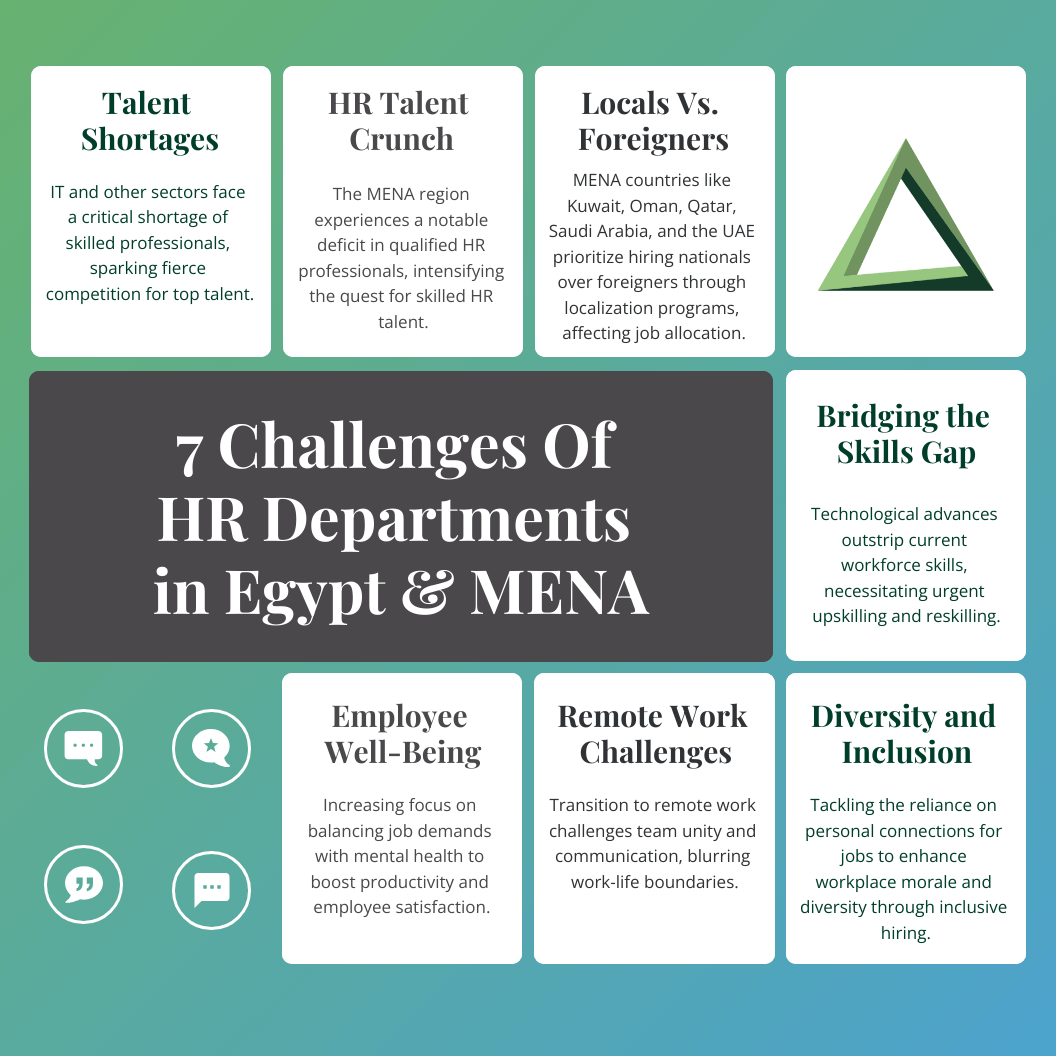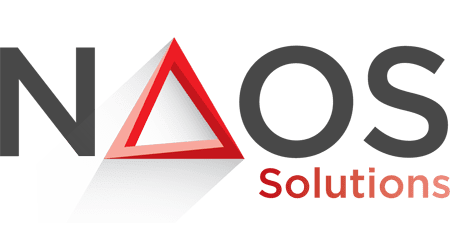Welcome to a pivotal exploration of Human Resources Outsourcing (HRO) in Egypt and the MENA region, a strategy reshaping how businesses optimize their most valuable asset: their people. If you aim to transform your HR department into a more agile, efficient powerhouse, you’ve landed in the right place. This article is crafted for HR directors, managers, and business leaders in the MENA region looking to leverage external HR expertise to scale their operations, attract top talent, and ensure compliance while managing costs effectively.

In this article, we’ll guide you through the rise of HRO, highlighting its key benefits. We’ll also take you on a retrospective journey of the past decade’s HR practices and challenges in the MENA region, delve into the economic and strategic drivers pushing the surge towards HRO, and explore the latest trends shaping its future.
Let’s embark on this journey to unlock HRO’s full potential and propel your organization toward its desired outcomes.
THE POWER AND PERKS OF HUMAN RESOURCES OUTSOURCING
What is Human Resources Outsourcing?
Organizations are increasingly recognizing Human Resources Outsourcing (HRO) as a pivotal strategy aiming to:
- streamline operations,
- enhance efficiency,
- sharpen their focus on core business goals.
At its core, HRO is about entrusting certain HR functions—ranging from payroll management to recruitment and beyond—to specialized external partners. This move broadens the HR management spectrum and gives businesses a strategic advantage in several key areas.
The global market for outsourcing HR services was $34,590 million in 2021. It will grow to $52,941.67 million by 2031, with a CAGR of 4.3% during the forecast period. According to Tecnavio’s most recent Human Resources Outsourcing Market study, MENA will likely outpace the global average with a higher CAGR.
The essence of HRO lies in its ability to offer flexibility and access to a pool of specialized talent and expertise that might only be available in some places. By outsourcing, companies can adapt more swiftly to market changes, optimize their cost structures, and ensure compliance with the latest regulations, which are crucial for maintaining organizational agility, resilience, and competitive edge.
Moreover, outsourcing HR functions allows companies to focus on what they do best—innovating, nurturing talent, and achieving strategic milestones—while leaving the complex, time-consuming tasks of HR management to the experts.

=> To fully understand how partnering with an HRO can drive your business forward, explore our detailed guide on the 10 Reasons to Consider HRO as a Business Partner.
The drivers behind the growing trend toward HR outsourcing are multifaceted. First, digitization enables more efficient and scalable HR processes that an HR outsourcer can easily manage externally. The increasing demand for neo-sourcing, which combines traditional outsourcing with new, innovative sourcing models, and the need to enhance the HR value chain for a more significant strategic impact further propel this trend forward.
As recruitment analytics adoption is on the rise, it offers deeper insights into hiring processes and candidate selection, thereby improving the quality of hires. The growing trend of implementing multi-country Payroll Outsourcing (PO) models highlights the importance of having coordinated HR strategies across international operations. Companies increasingly recognize cloud-based solutions as essential for providing scalable, flexible HR services tailored to their unique needs.
However, the shift towards HRO is not without its challenges. Increased reliance on outsourcing agencies can lead to potential issues in managing the employer-employee relationship and addressing employee concerns promptly. Moreover, navigating the complexities of regulatory compliance remains a significant hurdle, emphasizing the importance of choosing the right outsourcing partners. They must be experts in HR management and well-versed in their regions’ legal and regulatory frameworks.
The Key Benefits Organizations Can Harness By Entrusting Their HR Functions To External Experts
Flexibility in Managing Human Resources
- Adaptable Solutions:
Outsourcing HR functions provides organizations with unparalleled flexibility. Businesses can scale HR services up or down based on fluctuating needs, adapting to changing workforce dynamics and market demands.
- Focus on Core Competencies:
With external HR partners managing day-to-day operations, internal teams can concentrate on core business functions, driving innovation and growth.

Access to Specialized Talent and Expertise
- Tapping into Niche Skills:
Outsourcing HR grants access to specialized talent and expertise. External providers bring industry-specific knowledge, advanced technologies, and best practices, enhancing the overall proficiency of HR operations.
- Strategic Recruitment:
Leveraging external recruitment experts ensures access to a broader talent pool and the ability to attract candidates with specialized skills, contributing to organizational success.
Cost-Effective Solutions for Businesses of All Sizes
- Operational Cost Savings:
Outsourcing HR functions enables businesses to optimize operating costs. External providers often offer cost-effective solutions, allowing organizations to allocate resources more efficiently.
- Economies of Scale:
Small and medium-sized enterprises (SMEs) benefit from economies of scale, accessing the same HR expertise and technology as larger counterparts without prohibitive costs.
Improved Compliance and Reduced Risk
- Navigating Regulatory Challenges:
Employment laws and regulations are often complex and constantly evolving. As a result, it can be challenging for organizations to keep up-to-date with the latest changes and ensure compliance with legal requirements. External HR experts specialize in staying up-to-date with these laws and regulations and can help organizations maintain compliance with relevant legislation.
Organizations can benefit from external HR experts’ expertise, knowledge, and experience to help ensure they meet legal requirements. These experts can guide them on employment-related issues, such as wage and hour laws, anti-discrimination regulations, and workplace safety regulations.
- Risk Mitigation:
From payroll management to employee benefits administration, outsourcing HR functions mitigates risks by entrusting these critical processes to professionals well-versed in compliance requirements and risk mitigation strategies.

=> Read our blog article on Modernizing Human Resources in Egypt: Why Consider Outsourcing HR As Your Next Winning Strategy for more information.
A DECADE IN REVIEW: HR PRACTICES AND CHALLENGES
Over the past decade, HR professionals have transformed their practices to navigate a landscape shaped by technological advancements, changing workforce dynamics, and evolving expectations.
HR was vital in shaping a company’s culture, diversity, innovation, and adapting to dynamic work. The learnings from the past decade continue to guide HR practices as they navigate the evolving expectations and demands of the workforce in the years to come.
HR Department Practices
- Digital Transformation: The last decade witnessed a seismic shift towards digital HR solutions, with cloud-based platforms, AI-driven analytics, and automation becoming integral to talent management and HR processes.
- Employee Experience: There was a paradigm shift towards prioritizing the employee experience, emphasizing workplace culture, well-being initiatives, and personalized development plans.
- Remote Work Evolution: Accelerated by global events, remote work transitioned from a trend to a fundamental aspect of HR practices. HR departments adapted policies and technologies to support and manage distributed teams.
- Data-Driven Decision-Making: HR embraced analytics to make data-driven decisions, from recruitment strategies to performance evaluations, fostering more precise workforce planning.

Challenges Faced by HR Departments in the last decade in the MENA region
- Talent Shortages: A pervasive challenge was the scarcity of skilled talent in specific industries such as IT, leading to intense competition for top performers.
- The scarcity of skilled HR professionals is even more acute in most Middle Eastern countries than in the rest of the world.
- The development of “Locals” against “foreigners”: Countries like Kuwait, Oman, Qatar, Saudi Arabia, and the United Arab Emirates have implemented localization programs. The governments of these countries have implemented quotas and allocated specific job roles to be staffed solely by nationals.
- Skills Gap: Rapid technological advancements outpaced workforce skillsets, creating a skills gap that challenged HR departments to focus on upskilling and reskilling initiatives.
- Employee Well-Being: Balancing work demands with employee well-being became increasingly crucial, especially as the impact of stress and burnout on overall productivity was recognized.
- Remote Work Challenges: The sudden shift to remote work brought challenges in maintaining team cohesion, ensuring effective communication, and addressing the blurred boundaries between work and personal life.
- Diversity and Inclusion: Using personal connections to get a job, commonly called “wasta,” is still a widespread practice and social norm in the MENA region. Many organizations have realized the negative impact on employee morale and motivation, dissatisfaction, and low job engagement, negatively affecting the organization’s overall performance. Companies must diversify their recruitment approaches and methods to remedy this situation while hiring high-quality profiles. Using an external recruitment agency can be a profitable strategy.

FACTORS DRIVING THE SURGE TOWARDS HRO: NAVIGATING ECONOMIC REALITIES AND STRATEGIC IMPERATIVES
In the ever-evolving realm of business, it is necessary to move towards Human Resources Outsourcing (HRO), a strategic response to the economic imperatives of cost efficiency, the complexities of local labor laws, and the agile demands of rapid business expansion. By embracing outsourcing, organizations position themselves not just as cost-effective entities but as agile, compliant, and strategically focused enterprises ready to navigate the complexities of the modern business terrain.
The convergence of factors driving this paradigm shift mirrors the dynamic landscape of the global workforce.
Economic Factors and the Imperative of Cost Efficiency
- Strategic Cost Optimization: In an era where economic landscapes are ever-fluctuating, organizations must optimize operational costs strategically. HRO emerges as a potent solution, offering a pathway to operational excellence and financial prudence.
- Efficiency and Scalability: Outsourcing HR functions allows businesses to access scalable solutions that align with their specific needs, promoting efficiency without incurring excessive costs associated with in-house operations.
Navigating the Complexities of Local Labor Laws
- Expertise in Compliance: Local labor laws can be intricate and subject to frequent changes, challenging organizations to ensure compliance. HRO introduces a strategic advantage by tapping into the expertise of professionals well-versed in local regulations, mitigating the risks associated with legal non-compliance.
- Focus on Core Competencies: By outsourcing HR functions, organizations can redirect their internal resources toward core competencies, allowing external experts to navigate the complex landscape of local labor laws with precision and diligence.

Rapid Business Expansion and the Demand for Agile HR Solutions
- Global Expansion Dynamics: Organizations are transcending geographical boundaries in an era of rapid business expansion. HRO provides the agility needed to adapt HR functions seamlessly to diverse markets and regulatory environments, ensuring a consistent and compliant approach.
- Scalable Solutions for Growth: As businesses expand, scalable HR solutions become paramount. Outsourcing HR functions allows organizations to scale up or down swiftly, accommodating the demands of a growing or evolving workforce without compromising efficiency.
THE EVOLUTION OF HRO IN EGYPT AND THE MENA REGION
As the sun sets on traditional HR paradigms, the future of Human Resources Outsourcing (HRO) in Egypt and the MENA region unfolds with promises of innovation, adaptability, and strategic growth. Let’s peer into the crystal ball, exploring the trends shaping the HRO landscape and how companies can harness its potential for future growth.
Emerging Trends in HRO
- Advanced Technological Integration:
Advanced technologies are crucial in shaping the future of Human Resources Outsourcing (HRO). Artificial Intelligence (AI) and automation will be pivotal in streamlining routine HR tasks, enhancing efficiency, and providing data-driven insights for strategic decision-making.
- Focus on Employee Experience:
Tomorrow’s HRO will prioritize the employee experience, leveraging data analytics to personalize HR services. Companies will focus on well-being initiatives, creating workplaces that foster a sense of belonging and support employees’ holistic development.
- Globalization and Compliance Management:
With businesses expanding globally, HRO will evolve to offer seamless solutions for managing diverse workforces across borders. Expertise in global compliance will become a cornerstone, ensuring adherence to local laws and regulations.
- Flexibility and Scalability:
There will be a rise in demand for agile HR solutions. HRO will provide the flexibility and scalability needed to adapt to rapidly changing business environments, accommodating workforce size and structure fluctuations.
- Cybersecurity and Data Protection:
As data becomes the backbone of HR operations, future trends in HRO will prioritize robust cybersecurity measures and compliance with data protection regulations, safeguarding sensitive employee information.
You can check more details about “Key HR Statistics And Trends In 2024” from Forbes Advisor’s report to guide your organization’s growth and retention strategies.
Leveraging HRO for Future Growth
In the MENA region, tapping into Human Resources Outsourcing (HRO) is becoming a smart move for companies aiming for growth and agility. The idea isn’t just about keeping up with trends; it’s about using HRO as a powerful tool to build strong, flexible, and forward-looking businesses. Let’s break down how HRO can be a game-changer for future growth, with a focus on the unique landscape of the Middle East and North Africa.
- Strategic Workforce Planning:
Aligning your HR strategy with your business goals is vital. Outsourcing HR can help you get there. It’s about putting the right people in the right places to push your company forward. In the MENA region, economies are diversifying, and digital tech is rapidly reshaping industries. Outsourcing lets you focus on big-picture strategies by ensuring your HR efforts focus on boosting your growth plans.
- Focus on Core Competencies:
Outsourcing HR tasks means you can spend more time on what makes your business stand out. Staying ahead means innovating and moving quickly in a fast-paced market like MENA. By handing off HR chores to the experts, you keep your team lean and focused, ready to leap on new opportunities without getting bogged down by the nitty-gritty of HR management.
- Agility in Talent Management:
New skill demands make the MENA business scene rapidly changing. HRO offers the flexibility to scale your workforce up or down as needed, ensuring you have the right talent at the right time. This agility is a must for thriving in the region’s dynamic markets.
- Cost-Efficient Operations:
Balancing the budget without sacrificing quality or speed is a tall order. HRO can help by offering HR services on demand, saving you from the costs of an in-house HR department. This approach offers small to medium businesses in the region access to top-notch HR capabilities at an affordable price.
- Strategic HR Outsourcing Partnerships:
The success of HRO in MENA hinges on finding the right partners. It’s about more than just outsourcing tasks; it’s about building relationships with providers who get your business and are invested in your success. These partners should know the ins and outs of the local business environment, from navigating labor laws to understanding cultural nuances.
Given the unique business and regulatory environment in the MENA region, it’s crucial to work with HRO providers who deeply understand the local scene. This knowledge is key to ensuring compliance, respecting cultural practices, and effectively engaging with a diverse workforce.
CONCLUSION
The growing interest in HRO within the region indicates a significant shift towards more strategic, flexible, and efficient HR practices. By outsourcing HR functions, companies are optimizing their operations and positioning themselves to be more agile and responsive to the rapidly changing business landscape. This strategic approach enhances their competitive edge and fosters a more dynamic and innovative organizational culture.
For HR managers and business leaders looking to navigate the complexities of HR outsourcing and harness its full potential, the journey begins with choosing the right partner. NAOS Talents stands at the forefront of this transformative wave, offering expert guidance and tailor-made solutions to meet your specific HR needs.
Our team of experts is well-versed in the nuances of the MENA region’s HR landscape and is equipped to help you achieve operational excellence and strategic growth.
It is time to access a supportive ecosystem, shared administrative services, and mentorship for business growth by contacting us to explore NAOS Talents’ offerings.

